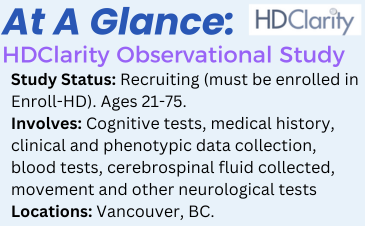Sponsored by: CHDI Foundation
 HDClarity collects cerebrospinal fluid (CSF): the liquid that surrounds the brain and spinal cord, to measure the progression of HD by measuring the biomarkers that reflect the changes inside the brain cells. This is a new international study aiming to collect samples of CSF from several types of volunteers: gene-positive people without any symptoms of HD, gene-positive people who have symptoms and people who are either gene-negative or have no family history of HD.
HDClarity collects cerebrospinal fluid (CSF): the liquid that surrounds the brain and spinal cord, to measure the progression of HD by measuring the biomarkers that reflect the changes inside the brain cells. This is a new international study aiming to collect samples of CSF from several types of volunteers: gene-positive people without any symptoms of HD, gene-positive people who have symptoms and people who are either gene-negative or have no family history of HD.
Participants will attend a screening and sampling visit. During the screening visit, medical history, and clinical and phenotypic data will be obtained. Participants who meet the eligibility requirements and are willing to continue in the study, will return for a sampling visit during which CSF and blood will be collected following an overnight fast: blood will be obtained via venipuncture and CSF will be obtained via lumbar puncture using local anaesthetic if required. Approximately 120 participants will be invited to attend an optional repeat sampling visit 4-6 weeks after the original sampling visit.
Status
Recruiting
Formal Name
HDClarity: a Multi-site Cerebrospinal Fluid Collection Initiative to Facilitate Therapeutic Development for Huntington’s Disease
Study Type
Observational
Purpose
HDClarity will seek to enroll approximately 600 research participants – 500 of whom will be at different stages of Huntington’s disease (HD) and 100 healthy controls. The primary objective is to collect a high quality CSF sample for evaluation of biomarkers and pathways that will enable the development of novel treatments for HD. The secondary objective is to generate a high quality plasma sample collection matching the CSF collections, which will also be used to evaluate biomarkers and pathways of relevance to HD research and development.
Canadian Locations and Contact Information
British Columbia
Location: University of British Columbia, The Centre for Huntingtons Disease, Vancouver
Status: Recruiting
Contact: Mike Adurogbangba
Phone: 604-822-4872, madurogbangba@movementdisorders.ca
Exclusion Criteria (individuals who do not meet inclusion criteria)
For all groups, participants are ineligible if they meet any of the following exclusion criteria:
- Current use of investigational drugs or participation in a clinical drug trial within 30 days prior to Sampling Visit; or
- Current intoxication, drug or alcohol abuse or dependence; or
- If using any antidepressant, psychoactive, psychotropic or other medications or nutraceuticals used to treat HD, the use of inappropriate (e.g., non-therapeutically high) or unstable dose within 30 days prior to Sampling Visit; or
- Significant medical, neurological or psychiatric co-morbidity likely, in the judgment of the Site Principal Investigator, to impair participant’s ability to complete study procedures; or
- Needle phobia, frequent headache, significant lower spinal deformity or major surgery; or
- Antiplatelet or anticoagulant therapy within the 14 days prior to sampling visit, including but not limited to: aspirin, clopidogrel, dipyridamole, warfarin, dabigatran, rivaroxaban and apixaban; or
- Clotting or bruising disorder; or
- Screening blood test results outside the lab’s normal range for the following: white cell count, neutrophil count, lymphocyte count, hemoglobin (Hb), platelets, prothrombin time (PT) and activated partial thromboplastin time (APTT); or
- Screening blood test results for C-reactive protein (CRP)>2× upper limit of normal; or
- Predictable non-compliance as assessed by Site Principal Investigator; or
- Inability or unwillingness to undertake any of the study procedures; or
- Exclusion during history or physical examination, final decision to be made by the Site Principal Investigator; including but not limited to: any reason to suspect abnormal bleeding tendency, e.g. easy bruising, petechial rash; or any reason to suspect new focal neurological lesion, e.g. new headache, optic disc swelling, asymmetric focal long tract signs; or any other reason that, in the clinical judgment of the operator or the Site Principal Investigator, it is felt that lumbar puncture is unsafe without brain imaging.
Sources
ClinicalTrials.gov A service of the U.S. National Institutes of Health
ClinicalTrials.gov Identifier: NCT02855476
This study is currently recruiting participants.
Verified March 19, 2018
For more detailed information on this study and others and for the most recent updates, please go to clinicaltrials.gov. ClinicalTrials.gov is a registry and results database of publicly and privately supported clinical studies of human participants conducted around the world.
